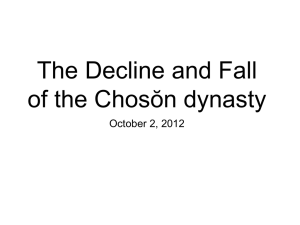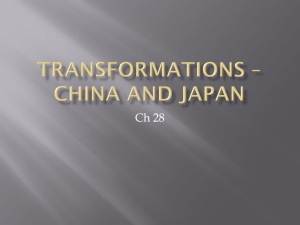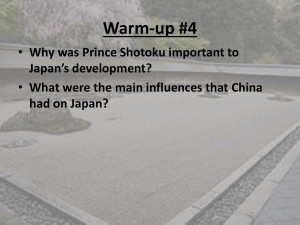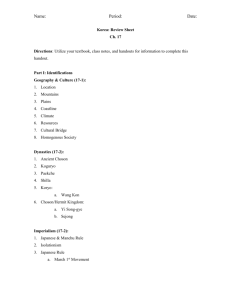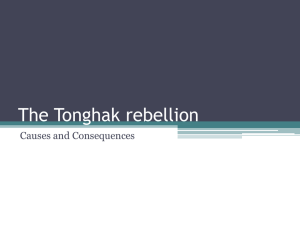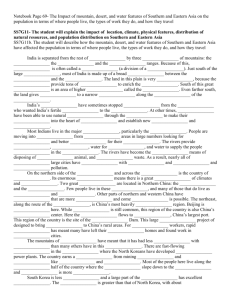File - ASIA337 History of the Korean People in Modern
advertisement
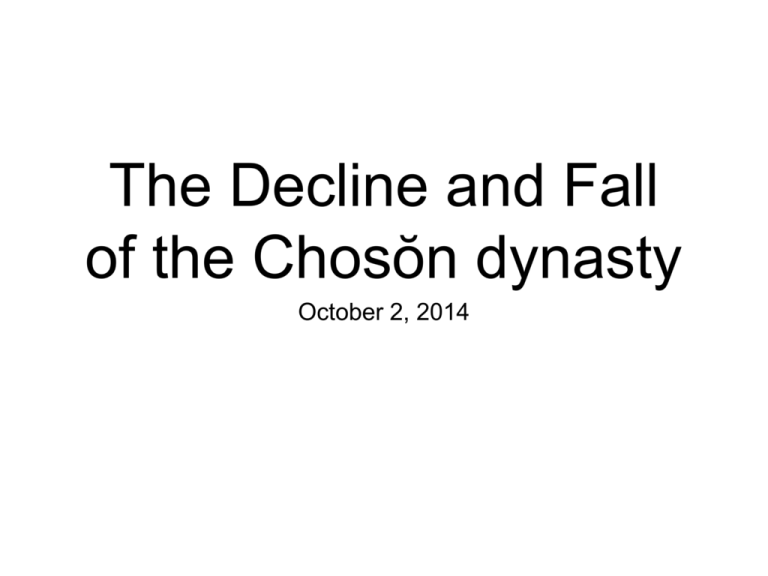
The Decline and Fall of the Chosŏn dynasty October 2, 2014 Review • Did anything in the last lecture surprise you? • What do you think was the main point of the last lecture? • What are the two basic ways people can respond to a radical challenge to their traditional beliefs and values? • What was Tonghak? What were its basic teachings? How religious was it? • Why did the 1884 reform movement fail? Motives for Responses to the challenge of imperialism • Can you call Yi Hangno or Yun Ch’iho nationalists? • Social Darwinism — modernize Korea quickly before it is swallowed up by bigger countries. • Pan-Asianism — Join with other Asian countries, including Japan, to resist Western imperialism • What could Korea do in the 1880s and 1890s to be able to resist imperialism? • In judging historical actors, be sure to distinguish intent from unintended consequences. The Tonghak Rebellion Why and when did this rebellion break out? Why is it called the “Tonghak” rebellion? How revolutionary was it? (Sources, pp.262-72) Be aware that the documents on pp. 263-4 and 265-66 are taken from a novel written in the 1930s and can’t be trusted. What was the relationship between the rebels and the Taewŏn’gun? Was Tonghak really opposed to the Chinese? What were the consequences for Korea of this rebellion? (How did the Sino-Japanese War affect Korea?) The Kabo reforms A Pro-Japanese reform government seizes control of the government, leaving the king on the throne. Sources pp. 172-275 What changes did they propose? separation of the royal household budget and the government budget End to discrimination based on social rank and gender. promote modern education. The fall of the reform cabinet The Russian-led Triple Intervention and the weakening of Japanese power. The killing of Queen Min The King flees to the Russian Embassy The King returns to his palace, and declares that he is the Emperor of the Great Han Empire. The Independence Club Who were the members of the Independence Club? The Independence Gate The Independence Daily A push for a “representative assembly” Why did it fail? Social Darwinism • What role did Social Darwinism play in the urgency with which a few educated Koreans pushed reform measures? • How was Social Darwinism in Korea different from Social Darwinism in the West? (Was it belief in victory of the strongest individuals or of the strongest societies? • What role did religion play in Korea’s reform thought? Discussion • Did the Enlightenment Party and the Independence Club propose practical solutions to the problems Korea faced in the last two decades of the 19th century? Problems • 1) lack of strong leadership at the central government level • 2) lack of financial resources to purchase technology and weapons • 3) lack of mass education in modern subjects • 4) lack of modern nationalism Three approaches • a) pro-Japanese modernizers • b) pro-American modernizers • c) traditionalists • d) armed resistance: • Righteous Armies • An Chung-gŭn (An Jung-geun) An Chung-gŭn • He assassinated Ito Hirobumi, whom he considered the architect of Japan’s seizure of Korea. • Did his assassination of Ito prevent or delay Japan’s annexation of Korea? • How did he reconcile his nationalism with his Pan-Asianism and acceptance of Japanese leadership of Asia? • He is considered a hero in Korea. Is that only because of his intentions or because of what his act accomplished as well? An Chung-gŭn on working with Japan (Writing about the Russo-Japanese War of 1904-05), In his “Treatise on Peace in the East,” An wrote: The Japanese Empire had told all the nations in the world that it was fighting for "peace in the East" and "Korean independence" and everyone firmly believed it. Those lofty ideals sank deeply into the hearts of the people of Korea and China. ….. Now, as Western power expands into the East, even a young child knows that the best plan is for the people here to unite our power so that we can defend ourselves. However, for some reason, Japan, without considering the situation, blindly harmed Korea, its neighbor of the same race, ending the friendly relations the two countries had maintained. This is just like the case where the "fisherman profits from the battle between the mussel and the kingfisher." Japan's actions have shattered the hopes of the people of China and Korea. Yi Wanyong’s immature nationalism • He was unable to see the royal family as separate from the Korean nation, so he worked more to protect the royal family than he did to protect Korea’s independence. • Served as Korea’s ambassador to the US from 1888 to 1890. Encouraged the king to flee to the Russian Embassy in Seoul after some Japanese killed the queen. He took refuge in the US embassy, but realized the US wasn’t going to help Korea. But he was a leading figure in the Independence Club. • Only became openly pro-Japanese after Japan defeated Russian in the Russo-Japanese War (1904-05) when he gave up hope for maintaining full independence for Korea. • He negotiated the 1910 treaty of annexation and got the Korean royal family recognized as royalty by the Japanese. Japan gets a free hand The Boxer Rebellion of 1900 in China The Anglo-Japanese Alliance of 1902 The Russo-Japanese War of 1904-05 (What role did the Ilchinhoe play in the war?) Protectorate agreement of 1905 Sources, pp. 312-313 Taft-Katsura Agreement of 1906 King Kojong forced to step down in 1907 --Korea refused admission to Hague Conference. What were the “Righteous Armies”? Why did they fail in their battles against the Japanese? 1910 Chosŏn becomes Chōsen, a Japanese colony Before Assigning Blame,Ask: • What could Korea have done to prevent absorption into the Japanese empire? • Did Korea have the military power to resist the Japanese military? • Is there any evidence that large-scale popular demonstrations against the Japanese takeover (no such demonstrations occurred in 1910) would have made any difference? • Could the government of the Taehan Empire do anything that would have enlisted foreign support for Korea’s independence? Why did Chosŏn fall? • weak economy meant no financial wherewithal to acquire modern military technology. • Lack of a strong military tradition. • weak monarch for most of the 19th century • system of balance of power between yangban and king that worked for almost 500 years did not allow the dramatic changes in policy needed to cope with a radically changing international environment. • the only foreign countries interested in Korea were too weak to keep the Japanese out of Korea. Besides, Korea relied far too long on China for protection.
